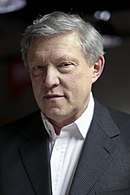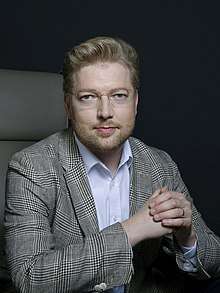Yabloko
The Russian United Democratic Party "Yabloko" (Russian: Росси́йская объединённая демократи́ческая па́ртия «Я́блоко» Rossiyskaya obyedinyonnaya demokraticheskaya partiya "Yabloko") is a Russian liberal[2][3][4] and social-liberal[17] political party founded by former Soviet Deputy Prime Minister Grigory Yavlinsky, as well as two Senators, and currently led by Nikolay Rybakov. The party's logo consists of a red circle and a green isosceles triangle, suggesting an apple in a constructivist style, a nod to the party's acronym which is a Russian word for "apple" (Russian: я́блоко, romanized: jábloko/yábloko). Yabloko’s party platform stands for a social market economy, fair competition in politics and the economy, is for the inviolability of private property, and for equal opportunity.
Russian United Democratic Party "Yabloko" Российская объединённая демократическая партия «Яблоко» | |
|---|---|
| Leader | Nikolay Rybakov[1] |
| Founder | Grigory Yavlinsky Yury Boldyrev Vladimir Lukin |
| Founded | 1993 |
| Merger of | Union of Greens of Russia (faction) (2016–present) |
| Headquarters | Moscow |
| Ideology | Liberalism[2][3][4] Social liberalism[5][6] Progressivism[7] Pro-Europeanism[8] |
| Political position | Centre[9][10] to centre‑left[11][12][13][14][15] |
| European affiliation | Alliance of Liberals and Democrats for Europe Party (full member) European Green Party (associate member for Green Russia faction)[16] |
| International affiliation | Liberal International |
| Colours | Green, Red |
| Federation Council | 0 / 170
|
| State Duma | 0 / 450 |
| Seats in the Regional Parliaments | 13 / 3,928
|
| Website | |
| www | |
| |
History
The party dates back to early 1990s. The immediate predecessor of the Yabloko party was the electoral cartel Yavlinsky-Boldyrev-Lukin, formed for the legislative elections of 1993. "Yabloko" is an acronym of the names of its founders: "Я" (Ya) for Grigory Yavlinsky; "Б" (B) for Yury Boldyrev, and "Л" (L) for Vladimir Lukin, with the full name meaning "apple" in Russian. The party stands for free markets and civil liberties in Russia, better relations with the United States and membership in the European Union. The party opposed president Boris Yeltsin's and his prime ministers' policies, earning the reputation of a determined opposition movement that nevertheless was devoted to democratic reforms (in contrast, most of the opposition was communist or far right at that time).[18] Similarly, it has continued to oppose Vladimir Putin for what they see as his increasing authoritarianism and has called for the removal of his government "by constitutional means."
Originally established as a public organization in 1993, it transformed into a political party in 2001. It contested the legislative elections of 1993, 1995, 1999, and 2003.
It is argued that the vote-count in the 2003 Russian parliamentary election was marred by fraud. Some exit-polls and parallel recounts conducted by opposition observers showed that Yabloko crossed the 5% threshold needed for parliamentary representation, gaining 6% of the vote, which should have been translated into some 20 parliamentary seats. Vladimir Putin himself telephoned Yavlinsky on the night of the election to congratulate his party on making it back into the Duma. However, most of these polls had a high margin of error (plus or minus three percent) and only showed Yabloko obtaining seats by a tiny margin. Official results announced by the Central Election Commission gave Yabloko 4.30% of the vote and no seats on the proportional party-list system. Only four Yabloko candidates won in individual district races and were elected to the Duma.
On 4 December 2005 Yabloko-United Democrats, a coalition formed by Yabloko and the Union of Rightist Forces, won 11% of the vote in the Moscow municipal elections and became one of only three parties (along with United Russia and the Communist Party) to enter the new Moscow City Duma. This success was seen by Yabloko leaders as a hopeful sign for the 2007 Russian parliamentary election, and reinforced the view that Yabloko and the Union of Rightist Forces need to unite in order to be elected to the State Duma in 2007.
The Commission on the Unification of Democratic Forces, under the chairmanship of Boris Nemtsov, was established by the Union of Rightist Forces on February 16, 2006. However, the merger plans were discarded in December 2006 since the differences seemed too large.[19]
The Russian Democratic Party Yabloko had been an observer of the Liberal International since 2002, and became a full member after the ELDR Bucharest congress in October 2006. The party's central office is located in Moscow.
In the 2007 Russian legislative election, Yabloko lost its representation in the State Duma.
In the Russian Regional elections on 4th of December 2011 Yabloko won a few places in regional parliaments of Russia: 6 of 50 in Legislative Assembly of Saint Petersburg, 4 of 50 in Legislative Assembly of the Republic of Karelia and 1 of 44 in Pskov legislative body.
In the Russian Regional elections on the 8th of September 2019 Yabloko won in different regional parliaments of Russia: 4 out of 45 seats in the Moscow City Duma and 1 in the Legislative Duma of Khabarovsk Krai. The party also managed to secure 111 municipal seats throughout the country, 81 of them in St Petersburg.
Leadership
| № | Leader | Took office | Left office | |
|---|---|---|---|---|
| 1 |  |
Grigory Yavlinsky | 16 October 1993 | 21 June 2008 |
| 2 | .jpg) |
Sergey Mitrokhin | 21 June 2008 | 20 December 2015 |
| 3 | _(cropped).jpg) |
Emilia Slabunova | 20 December 2015 | 15 December 2019 |
| 4 |  |
Nikolay Rybakov | 15 December 2019 | Incumbent |
Election results
Presidential election
| Presidency of Russia | ||||||
| Election year | Candidate | First Round | Second Round | |||
|---|---|---|---|---|---|---|
| # of overall votes |
% of overall vote |
# of overall votes |
% of overall vote | |||
| 1996 | Grigory Yavlinsky | 5,550,752 | 7.4% (#4) | |||
| 2000 | Grigory Yavlinsky | 4,351,450 | 5.9% (#3) | |||
| 2018 | Grigory Yavlinsky | 769,644 | 1.05% (#5) | |||
State Duma elections
| Election year | # of overall part-list votes |
% of overall party-list vote |
# of overall constituencies votes |
% of overall constituencies vote |
# of overall seats won |
+/– | Leader |
|---|---|---|---|---|---|---|---|
| 1993 | 4,223,219 (#6) | 7.9 | 1,849,120 (#4) | 3.5 | 27 / 450 |
||
| 1995 | 4,767,384 (#4) | 6.9 | 2,209,945 (#6) | 3.3 | 45 / 450 |
||
| 1999 | 3,955,611 (#6) | 5.9 | 3,289,760 (#4) | 5.1 | 20 / 450 |
||
| 2003 | 2,610,087 (#5) | 4.3 | 1,580,629 (#8) | 2.7 | 4 / 450 |
||
| 2007 | 1,108,985 (#6) | 1.6 | No constituencies | 0 / 450 |
|||
| 2011 | 2,252,403 (#6) | 3.4 | 0 / 450 |
||||
| 2016 | 1,051,335 (#6) | 2.0 | 1,323,793 (#6) | 2.6 | 0 / 450 |
||
Regional parliamentary elections
Regional parliaments of Russia in which Yabloko is represented.
| Regional Parliament | Election year | Seats | ||
|---|---|---|---|---|
| # | Position | |||
| 2016 | 3 / 36 |
#2[lower-alpha 1] | ||
| 2019 | 1 / 36 |
#4 | ||
| 2015 | 1 / 36 |
#3[lower-alpha 1] | ||
| 2016 | 2 / 44 |
#4 | ||
| 2016 | 2 / 50 |
#3 | ||
| 2019 | 4 / 45 |
#3 | ||
- Tied with other parties.
See also
Further reading
- Hale, Henry (2004). "Yabloko and the Challenge of Building a Liberal Party in Russia". Europe-Asia Studies. 56 (7): 993–1020. doi:10.1080/1465342042000294338.
- White, David (2006). The Russian Democratic Party Yabloko: Opposition in a Managed Democracy, Burlington: Ashgate.
References
- «Яблоку» предложили не прерывать съезд
- "Russia passes bill allowing Putin to stay in power past 2024". The Columbian. 11 March 2020. Retrieved 6 June 2020.
A member of the liberal Yabloko Party holds a poster reading: "You need to change the brain, not the constitution!" as he stages a one-man picket at the State Duma, the Lower House of the Russian Parliament in Moscow, Russia, Wednesday, March 11, 2020.
- "Russian opposition wrong-footed by Putin reform push". France 24. 22 January 2020. Retrieved 6 June 2020.
Some in the opposition, like the liberal Yabloko party, have said they will prepare alternative proposals to reform the constitution, which was adopted under Boris Yeltsin in 1993.
- "Chairman of Russia's Liberal Yabloko Party: Those Who Claim That The 'Street' Represents A Direct Road To Regime Change Are Lying". Middle East Media Research Institute. 6 August 2020. Retrieved 6 June 2020.
- White, David (2005). "Going their own way: The Yabloko Party's opposition to unification". Journal of Communist Studies and Transition Politics. 21 (4): 462–486. doi:10.1080/13523270500363395.
- Laura Lyytikainen, ed. (2016). Performing Political Opposition in Russia: The Case of the Youth Group Oborona. Routledge.
According to one ex-activist of Oborona who had been also part of the movement from the beginning, the coalition between the right-wing SPS and the more social-liberal oriented Yabloko was possible because of Putin's 'antidemocratic' politics
- Lewis, Paul G. (19 October 2018). Party Development and Democratic Change in Post-Communist Europe: The First Decade. Taylor & Francis US. ISBN 9780714681740 – via Google Books.
- Sharkov, Damien (23 February 2016). "Russian Vandals Stop Maidan Massacre Commemoration in St. Petersburg". Newsweek.
- Carroll, Oliver (7 February 2017). "Russia's Last Opposition Hero". Foreign Policy.
- "Moscow court reverses Sergei Mitrokhin election ban". Deutsche Welle. 13 August 2019. Retrieved 19 June 2020.
The Moscow city court ruled that the electoral commission should immediately register Mitrokhin of the centrist Yabloko party as a candidate, according to Russian state news agencies.
- Gowland, David; Dunphy, Richard; Lythe, Charlotte, eds. (2006). The European Mosaic (Third ed.). Pearson Education. p. 228. ISBN 9780582473706.
- Cucciolla, Riccardo Mario. "Introduction: The Many Dimensions of Russian Liberalism". In Cucciolla, Riccardo Mario (ed.). Dimensions and Challenges of Russian Liberalism: Historical Drama and New Prospects. Philosophy and Politics—Critical Explorations. Springer Nature. p. xxxi. doi:10.1007/978-3-030-05784-8. ISBN 978-3-030-05784-8. ISSN 2352-8370.
- Ross, Cameron (2009). Local Politics and Democratization in Russia. ISBN 9780415336543. Retrieved 8 May 2016.
- "Russian women denied protest against bill decriminalising domestic violence vow to keep fighting". International Business Times UK. 27 January 2017. Retrieved 19 June 2020.
The Russian United Democratic Party Yabloko, a centre-left opposition party with currently no representation in the parliament have launched a campaign against the law. They invited people to speak out on social media, using the hashtag: "I'm against the law on decriminalisation of domestic violence".
- Taras Kuzio, ed. (2007). Ukraine?Crimea?Russia: Triangle of Conflict. Columbia University Press. p. 111.
... the centre-left Yabloko, initiated the first votes in the Russian Supreme Soviet ... of the centre-right Union of Right Forces and became an adviser to President ..
- "Green Russia". European Greens.
- "How Russia's political parties line up". BBC News. 6 March 2012.
Yabloko's ideology is a mix of liberalism and social democracy.
- Shabaev, Andrey. "Российская многопартийность. Глава 4". partinform.ru.
- Sputnik (16 December 2006). "Russian liberal SPS, Yabloko parties give up unification plans". Retrieved 8 May 2016.
External links
| Wikimedia Commons has media related to Yabloko. |